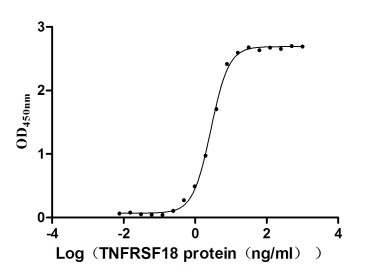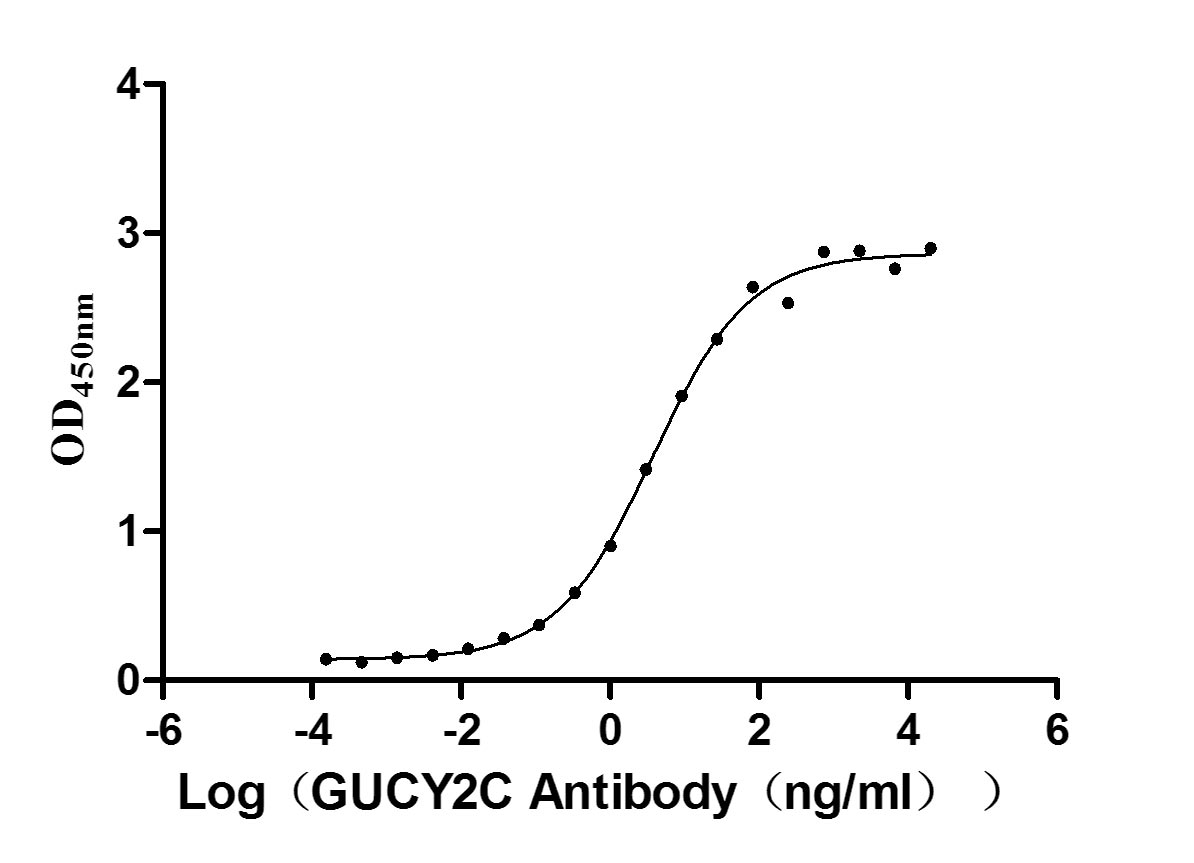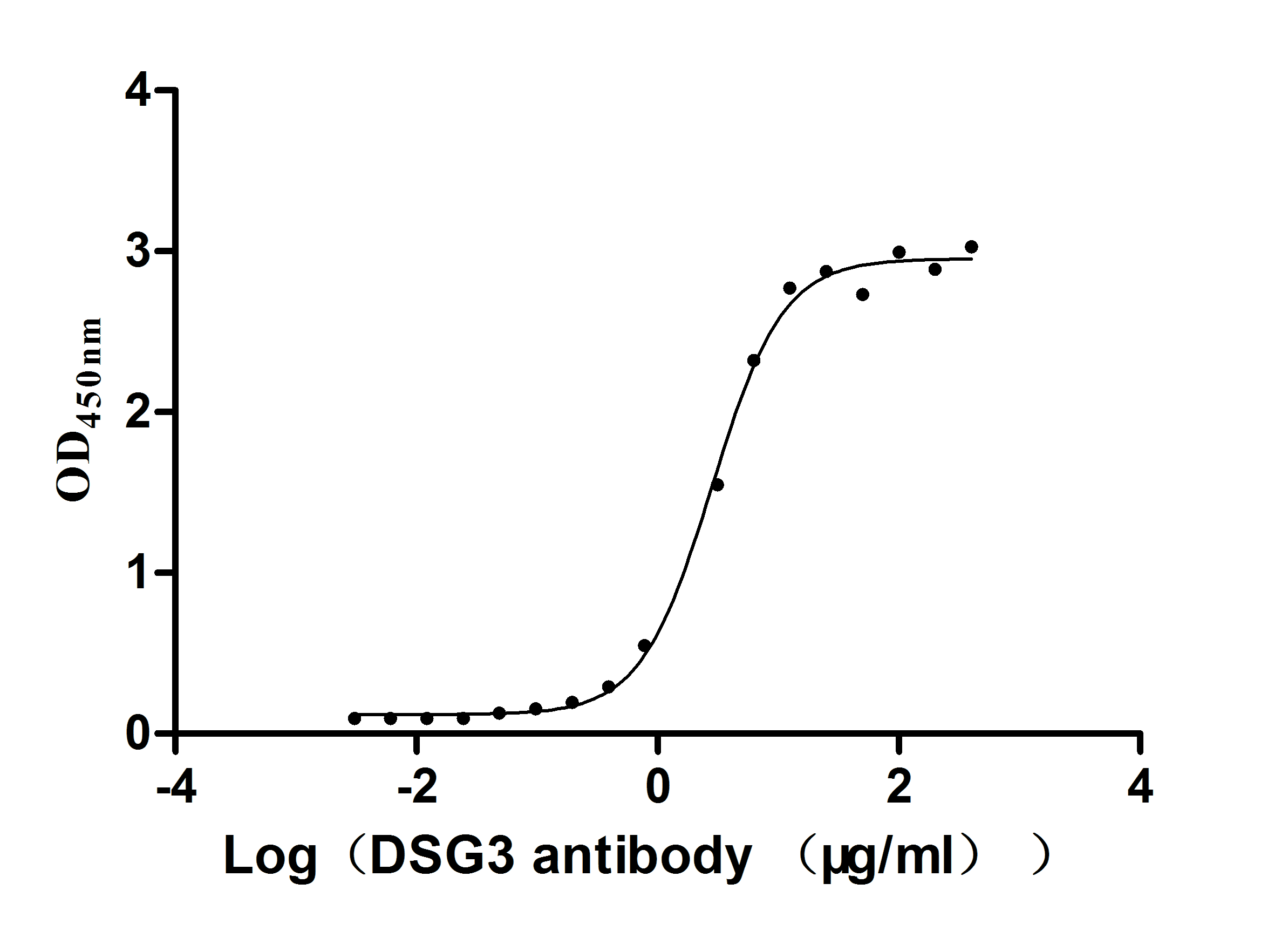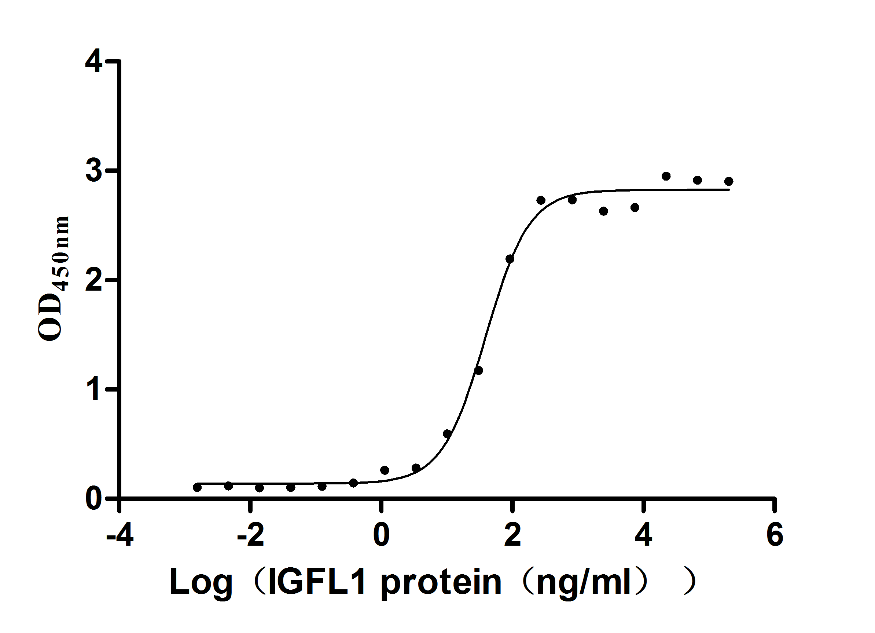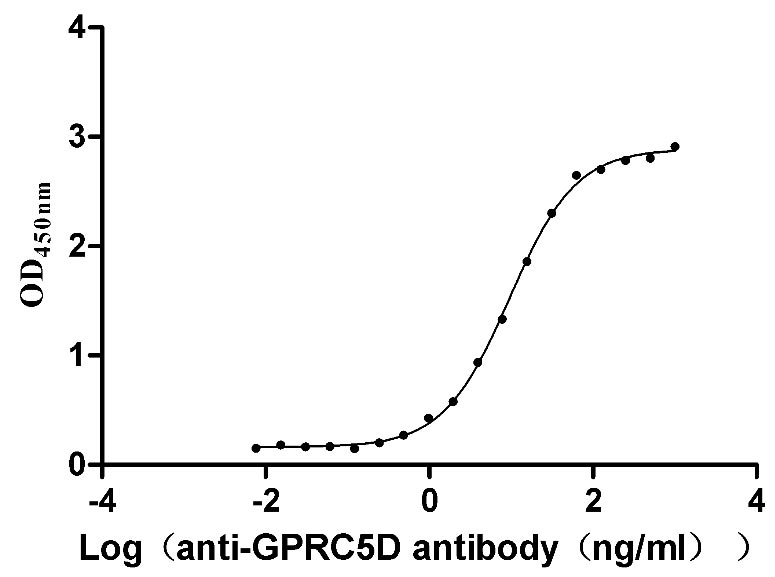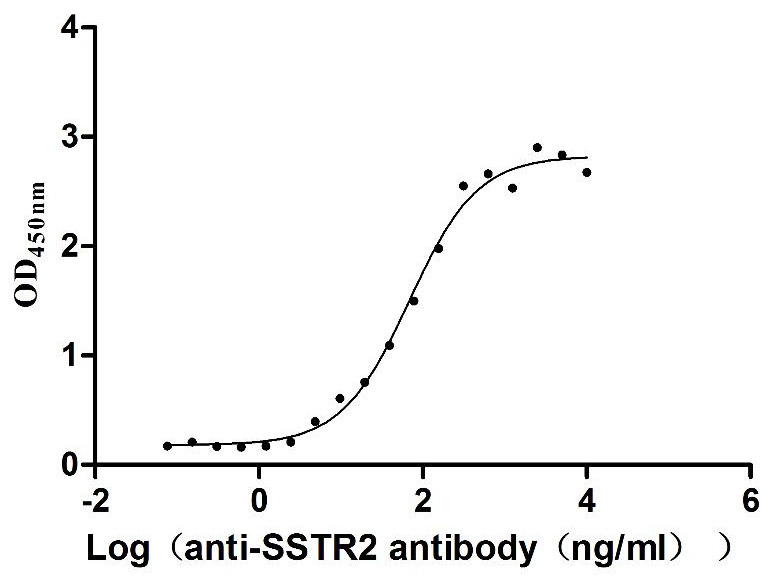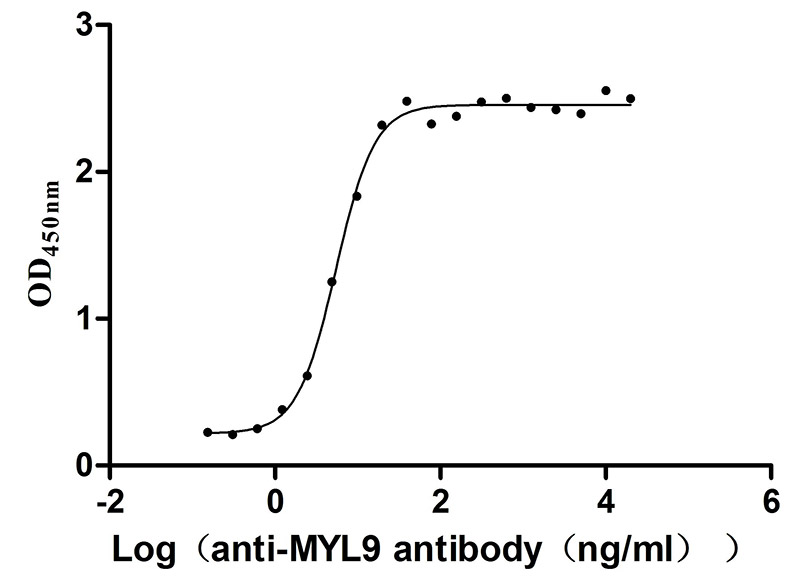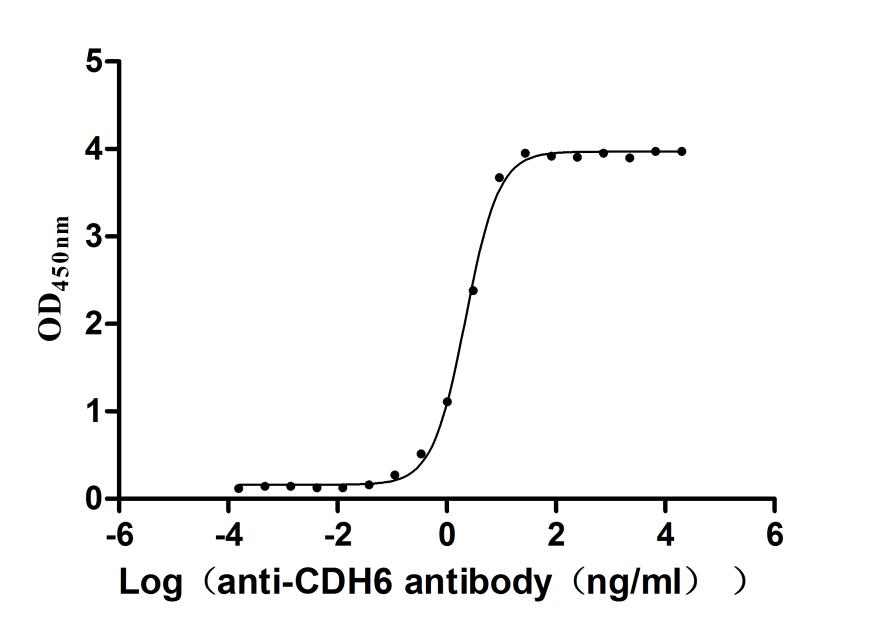Recombinant Mouse Trefoil factor 1 (Tff1)
-
货号:CSB-YP023431MO
-
规格:
-
来源:Yeast
-
其他:
-
货号:CSB-EP023431MO
-
规格:
-
来源:E.coli
-
其他:
-
货号:CSB-EP023431MO-B
-
规格:
-
来源:E.coli
-
共轭:Avi-tag Biotinylated
E. coli biotin ligase (BirA) is highly specific in covalently attaching biotin to the 15 amino acid AviTag peptide. This recombinant protein was biotinylated in vivo by AviTag-BirA technology, which method is BriA catalyzes amide linkage between the biotin and the specific lysine of the AviTag.
-
其他:
-
货号:CSB-BP023431MO
-
规格:
-
来源:Baculovirus
-
其他:
-
货号:CSB-MP023431MO
-
规格:
-
来源:Mammalian cell
-
其他:
产品详情
-
纯度:>85% (SDS-PAGE)
-
基因名:
-
Uniprot No.:
-
别名:Tff1; Bcei; Ps2; Trefoil factor 1; Protein pS2
-
种属:Mus musculus (Mouse)
-
蛋白长度:Full Length of Mature Protein
-
表达区域:22-87
-
氨基酸序列QAQAQAQAQ EETCIMAPRE RINCGFPGVT AQQCTERGCC FDDSVRGFPW CFHPMAIENT QEEECPF
-
蛋白标签:Tag type will be determined during the manufacturing process.
The tag type will be determined during production process. If you have specified tag type, please tell us and we will develop the specified tag preferentially. -
产品提供形式:Lyophilized powder
Note: We will preferentially ship the format that we have in stock, however, if you have any special requirement for the format, please remark your requirement when placing the order, we will prepare according to your demand. -
复溶:We recommend that this vial be briefly centrifuged prior to opening to bring the contents to the bottom. Please reconstitute protein in deionized sterile water to a concentration of 0.1-1.0 mg/mL.We recommend to add 5-50% of glycerol (final concentration) and aliquot for long-term storage at -20℃/-80℃. Our default final concentration of glycerol is 50%. Customers could use it as reference.
-
储存条件:Store at -20°C/-80°C upon receipt, aliquoting is necessary for mutiple use. Avoid repeated freeze-thaw cycles.
-
保质期:The shelf life is related to many factors, storage state, buffer ingredients, storage temperature and the stability of the protein itself.
Generally, the shelf life of liquid form is 6 months at -20°C/-80°C. The shelf life of lyophilized form is 12 months at -20°C/-80°C. -
货期:Delivery time may differ from different purchasing way or location, please kindly consult your local distributors for specific delivery time.Note: All of our proteins are default shipped with normal blue ice packs, if you request to ship with dry ice, please communicate with us in advance and extra fees will be charged.
-
注意事项:Repeated freezing and thawing is not recommended. Store working aliquots at 4°C for up to one week.
-
Datasheet :Please contact us to get it.
靶点详情
-
功能:Stabilizer of the mucous gel overlying the gastrointestinal mucosa that provides a physical barrier against various noxious agents.
-
基因功能参考文献:
- these data suggest that TFF1 might help cells to counteract Helicobacter colonization and the development of a chronic inflammation. PMID: 29085807
- The data suggest that the tumor suppressor activity of both RUNX1t1 and TFF1 are mechanistically connected to CEBPB and that cross-regulation between CEBPB-RUNX1t1-TFF1 plays an important role in gastric carcinogenesis. PMID: 27522676
- the Tg(Tff1-CreERT2;Tff2-rtTA;Tff3-Luc) strain can confer intermittent transgene expression to gastric epithelial cells that have undergone previous gene modification, and may be suitable to genetically model therapeutic intervention during development, tumorigenesis, and other genetically tractable diseases PMID: 27731922
- The up-regulated expression of Tff1 is probably the result of a complex inflammatory process as its expression is induced by tumor necrosis factor alpha as well as interleukins 1beta and 17. PMID: 27832633
- Loss of TFF1 could be a critical step in promoting the H. pylori-mediated oncogenic activation of beta-catenin and gastric tumorigenesis. PMID: 25980439
- Findings underscore an important protective role of TFF1 in abrogating H. pylori-mediated inflammation, a crucial hallmark of gastric tumorigenesis. Loss of TFF1 expression could be an important step in H. pylori-mediated gastric carcinogenesis. PMID: 26372254
- TFF1 and TFF3 peptides might be involved in the complex processes of nervous system development and differentiation and brain plasticity. PMID: 25725142
- Loss of TFF1 promotes beta-catenin activation and gastric tumorigenesis through regulation of PP2A, a major regulator AKT-GSK3Beta signaling. PMID: 25107557
- Loss of Tff1 and high expression of cox2 are associated with gastric adenomas. PMID: 22034055
- increased oncogenic potential of MCF7 cells in the absence of TFF1 was confirmed in vivo in nude mice PMID: 21358676
- loss of TFF1 leads to activation of IKK complex-regulated NF-kappaB transcription factors and is an important event in shaping the NF-kappaB-mediated inflammatory response during the progression to gastric tumorigenesis PMID: 21490402
- Initiation of antral gastric cancer is associated with progressive epigenetic silencing of TFF1, which can be suppressed by the hormone gastrin. PMID: 21111741
- Studies indicate that TFF1-knockout mice demonstrate amplification and invasiveness of gastric stem/progenitor cells. PMID: 20036835
- gene activation mediated by SHP2 and STAT pathways in gp130 mutant mice PMID: 12219085
- Estrogen acts directly on the developing vagina in the permanent induction of TFF1 gene expression. TFF1 may be a useful marker for developmental estrogenization syndrome of the mouse vagina. PMID: 16133145
- The results presented indicate for the first time that allergen exposure leads to the trans-differentiation of Clara cells toward a TFF1-expressing mucous phenotype. PMID: 16990615
- This study shows that the progenitors of pit and gland mucous cells contribute to gastric carcinogenesis in the pyloric antrum of TFF1 knockout mice. PMID: 19040570
显示更多
收起更多
-
亚细胞定位:Secreted.
-
组织特异性:Strong expression found in normal gastric mucosa. Not detected in the small or large intestine nor in normal mammary gland.
-
数据库链接:
KEGG: mmu:21784
STRING: 10090.ENSMUSP00000024831
UniGene: Mm.2854
Most popular with customers
-
Recombinant Human Tumor necrosis factor receptor superfamily member 18 (TNFRSF18), partial (Active)
Express system: Mammalian cell
Species: Homo sapiens (Human)
-
Recombinant Human Heat-stable enterotoxin receptor (GUCY2C), partial (Active)
Express system: Mammalian cell
Species: Homo sapiens (Human)
-
Recombinant Mouse Desmoglein-3 (Dsg3), partial (Active)
Express system: Mammalian cell
Species: Mus musculus (Mouse)
-
Recombinant Human IGF-like family receptor 1 (IGFLR1), partial (Active)
Express system: Mammalian cell
Species: Homo sapiens (Human)
-
Recombinant Human G-protein coupled receptor family C group 5 member D (GPRC5D)-VLPs (Active)
Express system: Mammalian cell
Species: Homo sapiens (Human)
-
Recombinant Human Somatostatin receptor type 2 (SSTR2)-VLPs (Active)
Express system: Mammalian cell
Species: Homo sapiens (Human)
-
Recombinant Human Myosin regulatory light polypeptide 9 (MYL9) (Active)
Express system: Yeast
Species: Homo sapiens (Human)
-
Recombinant Macaca fascicularis Cadherin 6(CDH6),partial (Active)
Express system: Mammalian cell
Species: Macaca fascicularis (Crab-eating macaque) (Cynomolgus monkey)


